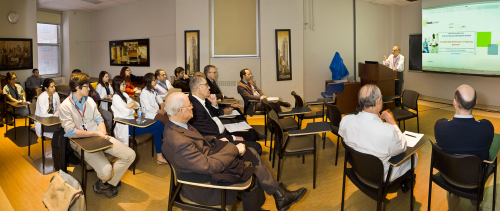
The Rossy Cancer Network (RCN) balanced scorecard is a management tool designed to measure, analyze and monitor the performance of the organization. The Donabedian scorecard method developed in 1966 focuses on structure, process, and outcome and remains the model of choice for evaluating the quality of health care.
As part of its mission to improve the quality, effectiveness, and efficiency of cancer care, the RCN is working through the development of a first release of the balanced scorecard that will be used by its partners: the St. Mary’s Hospital Center (SMHC), the Jewish General Hospital (JGH) and the McGill University Health Centre (MUHC).
The RCN’s partner hospitals have been working with various tools, including their own scorecards, to evaluate quality and outcomes. Their combined experience with this tool has been invaluable to the creation of the RCN balanced scorecard, which boasts a high quality, user-friendly design that provides contextualized results.
The first iteration of the scorecard will be launched in January 2014 and future iterations will be released on a quarterly basis and will serve to provide feedback to clinicians and decision-makers about the quality of care they provide and the areas that need improvement. The database will grow over time and the product will be continuously fine-tuned.
A team of dedicated multidisciplinary experts from each of the RCN institutions carefully selected the quality indicators needed for performance assessment.
Dr. Gerald Batist, Director of the Segal Cancer Centre at the JGH and head of the dynamic team, says, “To develop a scorecard that is judged by the healthcare providers to be truly reflective of quality and outcomes in their expert areas of cancer care, we depend on bona fide evidence in the literature but more than that, we aim to have all of the healthcare providers across institutions and specialties find consensus on these. This is perhaps the most challenging and time-consuming element of the process and we have indeed accomplished this.”
The initial focus of the network scorecard will be the four major cancers: breast, colorectal, prostate and lung cancer. Quality indicators include treatment, access and patient flow, safety and risk management, quality of the work environment, palliative care, psychosocial care and patient experience.
Cancer patients will also have access to the RCN balanced scorecard. They can use the data to ask questions of their caregivers and make informed decisions about their treatment.
“Ultimately, by applying common questions across the network to measure quality and outcomes, and making these data public, the entire RCN network will be highly incentivized to make improvements. In other words, this common scorecard will engage a collaborative ' spirit amongst the different centers, as they find common cause in improving care. This will be a great benefit to the patients,“ says Dr. Batist.
The RCN balanced scorecard will help create the same standards of care across the hospitals. The overall aim is to allow cancer patients to move seamlessly through the partner institutions and benefit from an integrated and increasingly higher standard of care, ultimately achieving world-class outcomes in patient survival and satisfaction. In addition to reporting, the scorecard will also provide a roadmap for quality and performance improvement and enable the RCN to benchmark its performance against other leading cancer centres in Quebec, Canada and the rest of the world.
